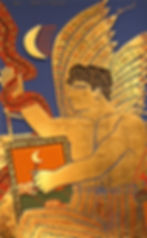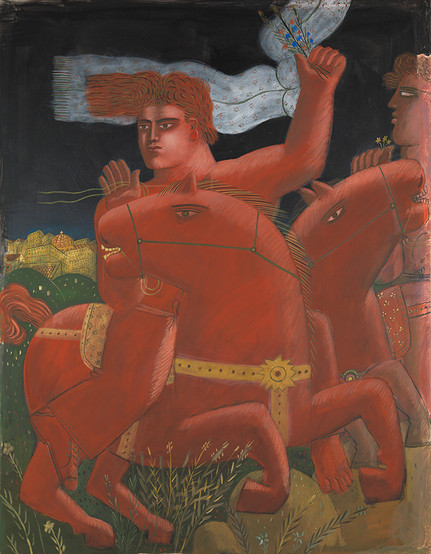The Life and Times of Alekos Fassianos
- Apr 7, 2022
- 3 min read
Updated: Jun 23, 2023

Born in Athens in 1935, Alekos Fassianos was an emblematic figure of the Greek 20th century art scene and one of Greece’s most celebrated painters. He passed away on January 16 2022.
Fassianos's interests and talents were seemingly marked from an early age; his father was a music teach and composer while his mother, who had a keen interest in history, taught ancient Greek and took the children to archaeological sites. His grandfather's influence was most keen, and it was he who encouraged Fassianos to pursue art. In 1945, amidst the horrors of the Second World War and the Greek Civil War, Fassianos began to paint.

In what may be owed to his father's profession, Fassianos first studied the violin at the National Conservatory of Athens for twelve years and it was here where he met musicians like Mikis Theodorakis and Yannis Markopoulos, figures who would continue to be important in his life.
From here, Fassianos entered and studied painting at the Athens School of Fine Art under famous Greek visual artist Yiannis Moralis, while also frequenting the studios of other renowned painters, particularly that of Yiannis Tsarouchis.
In 1960, he set off for Paris to study lithography at the Ecole Superieure des Beaux Arts wherein he integrated into the art scene and became acquainted with the many poets, writers and artists of the city. It was during this decade, the 1960s, that his unique anthropocentric style was developed, following a brief move back to Athens after his studies where he and two friends opened a studio in the Kallithea neighbourhood amongst Greece's own art scene.
Fassianos soon found himself back in Paris where he would live for the next 35 years.
The 1970s brought with it solo exhibitions in Paris, New York, Milan, Geneva and Sao Paolo, a trend that continued into the 1980s with Munich, Japan and Sweden now part of catalogue of shows, with Melbourne added in 2011 with an exhibition at the Hellenic Museum and numerous retrospectives over the years too.
Over his career, which spanned more than five decades, Fassianos' work has been exhibited across four continents in over 70 exhibitions. In recognition of his achievements and contribution to art, he has been awarded various prestigious honours, including Commander of the Order of Arts and Letters by France, Honorary Member of the Russian Academy of Fine Art and in Greece.

Fassianos’ artistic style, which began as abstract, and later expressionist painting, evolved into his recognisable signature style of flat, solid coloured silhouettes, which have made him one of the most easily recognised and beloved Greek artists. He drew his subjects from Greek myths, Byzantine icons and coins, Fayum portraits, the Shadow Theatre and the Greek cultural and geographical landscape.
The juxtaposition of the ancient and modern is also a recurrent feature of Fassianos’ work, as is what he terms ‘myth of Greekness’. As such, his art is filled with heroic nudes and ancient ruins set against the cosmopolitan café lifestyle of modern Greece. Initially the works may seem simple but the layers of elements which make up a work give them hitherto unsuspected depth.
The works are also often characterised by motion which is emphasized by hair or clothing blowing as if in a breeze and all but jump from the walls. The bright, bold structure of his works and his use of colour make these arresting images a must see.

His works share qualities with artists like Matisse, Picasso and Botero. However, unlike other Greek artists of his generation, he did not clearly embrace any of the European avant-garde movements of the time. He remained faithful to figurative painting and his Greek heritage, retaining his respect for the lessons of the ‘30s generation, his love for Greek art (ancient, byzantine and folk) and his understanding of what it is to be Greek.

Colour should always have meaning!
-Alekos Fassianos, Athens 1964
Currently the Alekos Fassianos Estate is in the process of undertaking a long-term project to publish a comprehensive catalogue of Fassianos' work in a single, digital catalogue, and concurrently archive the artists' sketches, drafts, studies, etching, books and documents of his creative process.
You can read more on this project and Fassianos here














